Taewon Ahn (b. 1993), also known by the name ppuri, has been transforming rapidly circulating digital images—such as internet memes—into physical forms through painting and sculpture. Ahn regards the internet not merely as a virtual space, but as a new kind of material network shaped through the interactions between humans, environments, and technology. Within this framework, the artist sensually explores and expresses the complex relationships that emerge in digital space.
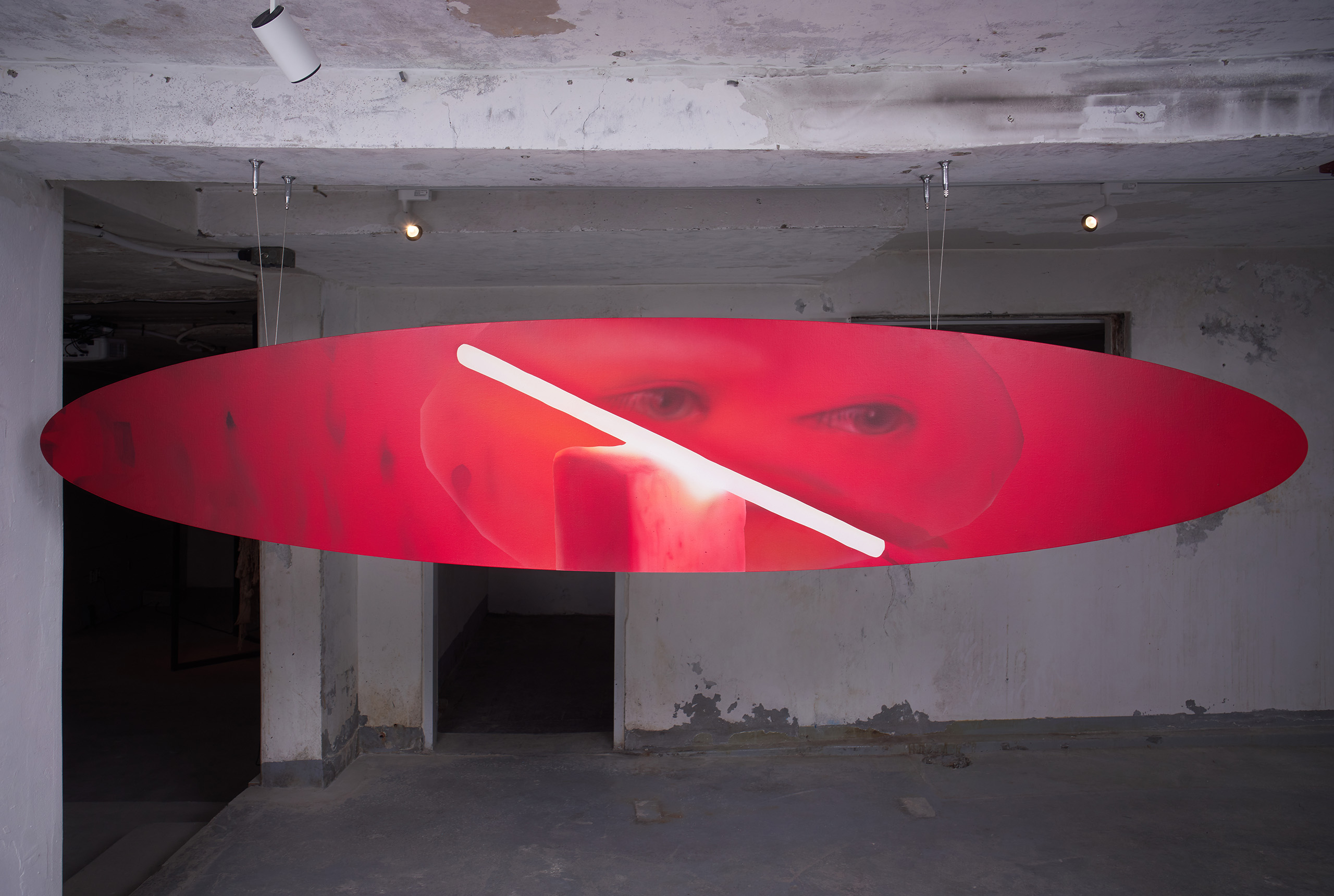 Taewon Ahn,
return of the jedi, 2021, Acrylic on canvas, 237.5x47.5cm ©Taewon Ahn
Taewon Ahn,
return of the jedi, 2021, Acrylic on canvas, 237.5x47.5cm ©Taewon AhnBorn in the early 1990s during the
transition from analog to digital, Taewon Ahn naturally internalized a digital
sensibility as he grew up. His interest in the world of the internet was also
shaped by childhood experiences with computers, influenced by his father who
worked as a programmer.
Ahn’s early works took the form of
paintings in which he transposed internet memes circulating online—onto
custom-made canvases. Produced and consumed by anonymous masses, memes are
rapidly replicated, altered, and disseminated, only to quickly reach the end of
their lifespans.
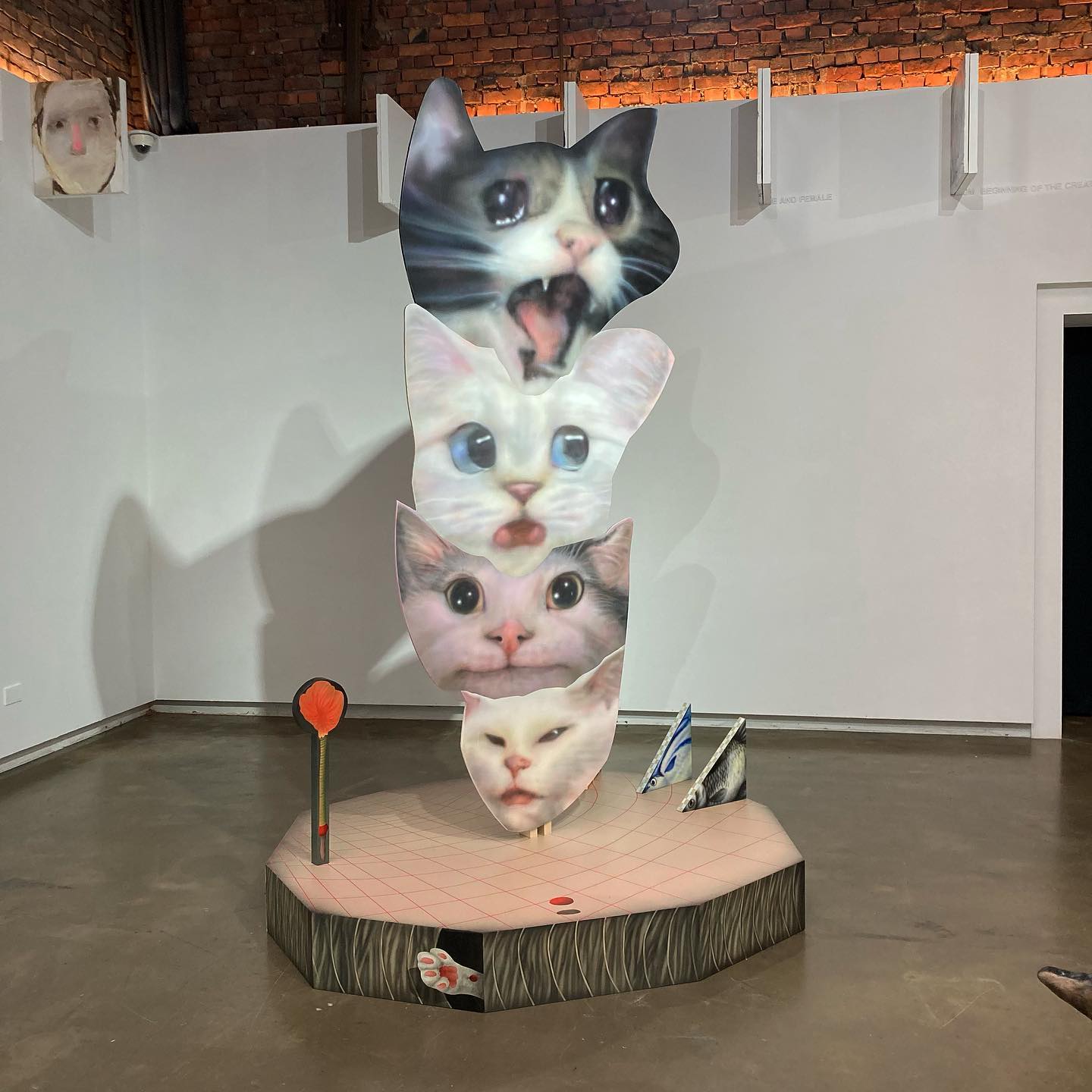 Taewon Ahn,
My four moods of a day, 2021, Installation view of 《Spirit
shackle》 (SeMA Storage, 2021) ©Taewon Ahn
Taewon Ahn,
My four moods of a day, 2021, Installation view of 《Spirit
shackle》 (SeMA Storage, 2021) ©Taewon AhnTaewon Ahn focused on the seemingly trivial
and clumsy yet visually captivating qualities of memes. Rather than delving
into their narrative or symbolic content, he honed in on their surface
appeal—visual images that, while easily overlooked, have the power to grab
attention. Like reproducing a single meme, Ahn rapidly transfers these fleeting
and ever-changing digital images into the physical realm.
To do this, he opts for an airbrush over a
traditional paintbrush. The airbrush allows for faster execution and produces
effects that resemble images edited in digital programs—qualities that align
closely with the nature of his subject matter.
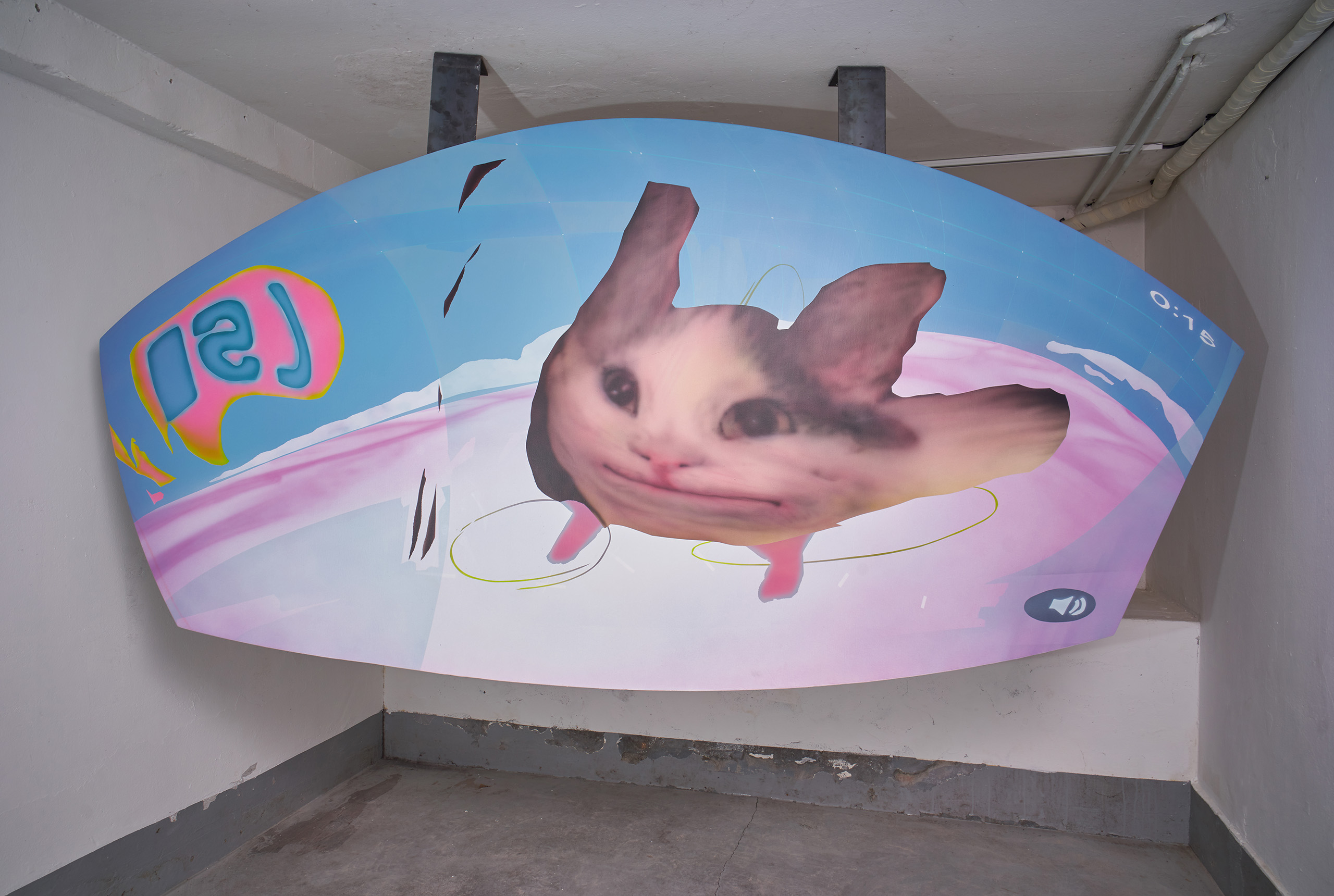 Taewon Ahn,
far away, 2021, Acrylic on canvas, 237x118cm ©Taewon Ahn
Taewon Ahn,
far away, 2021, Acrylic on canvas, 237x118cm ©Taewon AhnIn addition, Ahn creates and utilizes his own custom-shaped canvases, granting new material form to internet images that often feel light and thus even more immaterial. For instance, in far away (2021) and guardian (2021), he designed canvases that emphasize the distorted contours of popular cat memes. These works resemble images that have been digitally “cut out” using editing software, thereby amplifying the material sensation evoked by the visual forms of digital imagery.
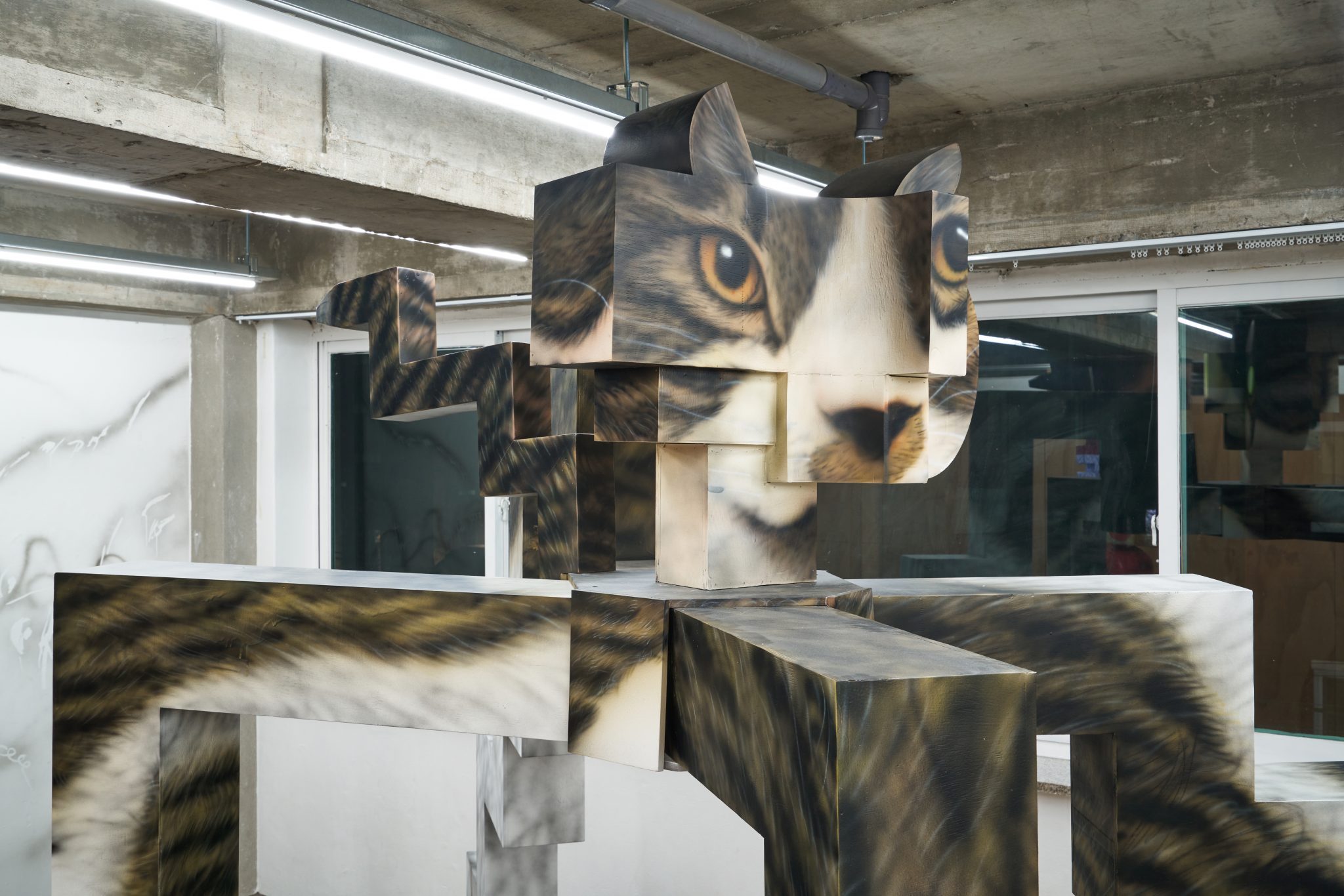 Taewon Ahn,
My Cat is Rockstar, 2022, Installation view of 《PICREN》
(AlterSide, 2022) ©AlterSide
Taewon Ahn,
My Cat is Rockstar, 2022, Installation view of 《PICREN》
(AlterSide, 2022) ©AlterSideAfter previously translating all sorts of internet memes onto canvas, the artist began painting real-life cats following the adoption of a stray kitten named Hiro. As Ahn spent more time living with his feline companion and less time staring at his smartphone, his attention naturally shifted from digital cats to the real cat before him.
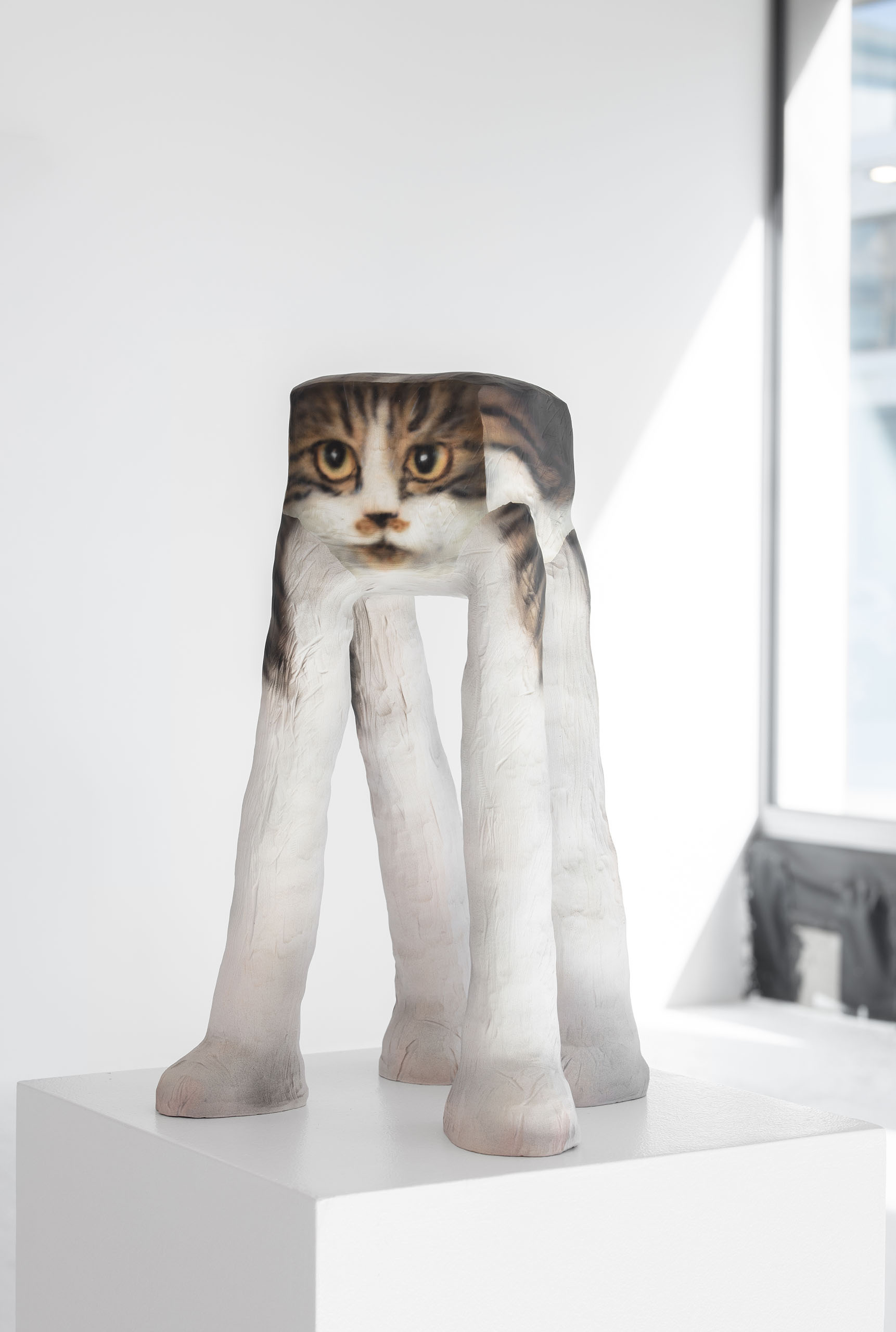 Taewon Ahn,
Hiro is everywhere, 2022, Acrylic on canvas, 39x25x25cm ©Taewon
Ahn
Taewon Ahn,
Hiro is everywhere, 2022, Acrylic on canvas, 39x25x25cm ©Taewon
AhnAgainst this backdrop, Ahn began his
ongoing series ‘Hiro is everywhere’ (2021–), which reimagines his cat Hiro
through the lens of endlessly replicating and proliferating internet memes. In
this series, Hiro becomes a subject of both painting and sculpture, embodying
the viral quality of digital imagery.
‘Hiro is everywhere’ reflects the artist’s
personal desire for Hiro to become a “meme star” of the internet world. By
placing Hiro in various scenarios and infusing the works with emotion and
humor, Ahn playfully elevates his feline companion into a pop-cultural icon.
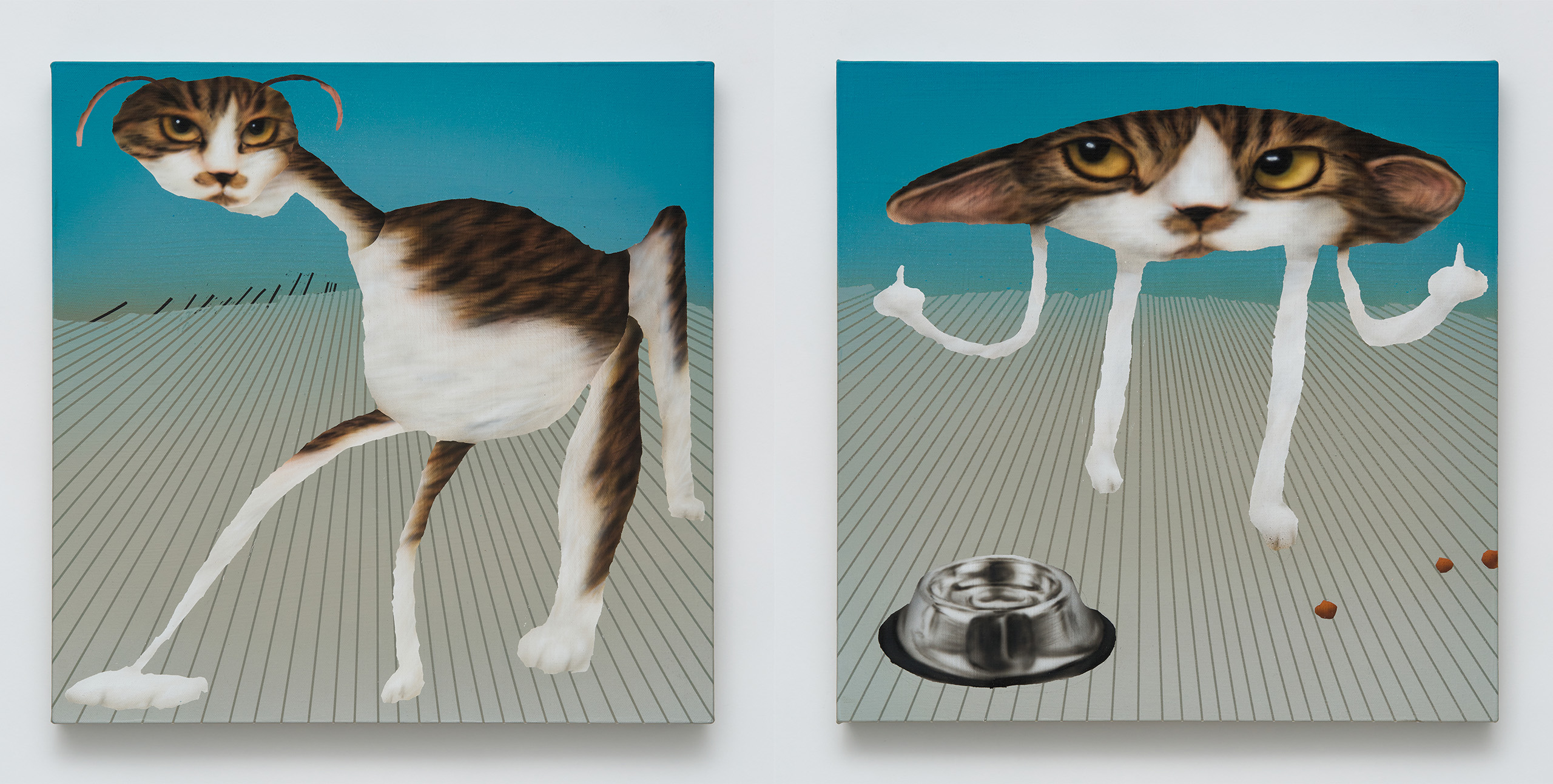 Taewon Ahn,
dragon, 2022, Acrylic on canvas, 45x45cm, give me some
food, 2022, Acrylic on canvas, 45x45cm ©Taewon Ahn
Taewon Ahn,
dragon, 2022, Acrylic on canvas, 45x45cm, give me some
food, 2022, Acrylic on canvas, 45x45cm ©Taewon AhnIn this series, Ahn repeatedly transforms
and distorts photographs of Hiro—taken by the artist himself—replicating them
across various surfaces in a manner reminiscent of internet memes. Without a
fixed form, Hiro’s image is continually warped and reproduced, multiplying
within physical space like a meme in the digital realm.
This process of applying distorted images
of Hiro onto irregular sculptural surfaces closely resembles texture mapping in
computer graphics, where two-dimensional images are wrapped onto
three-dimensional models.
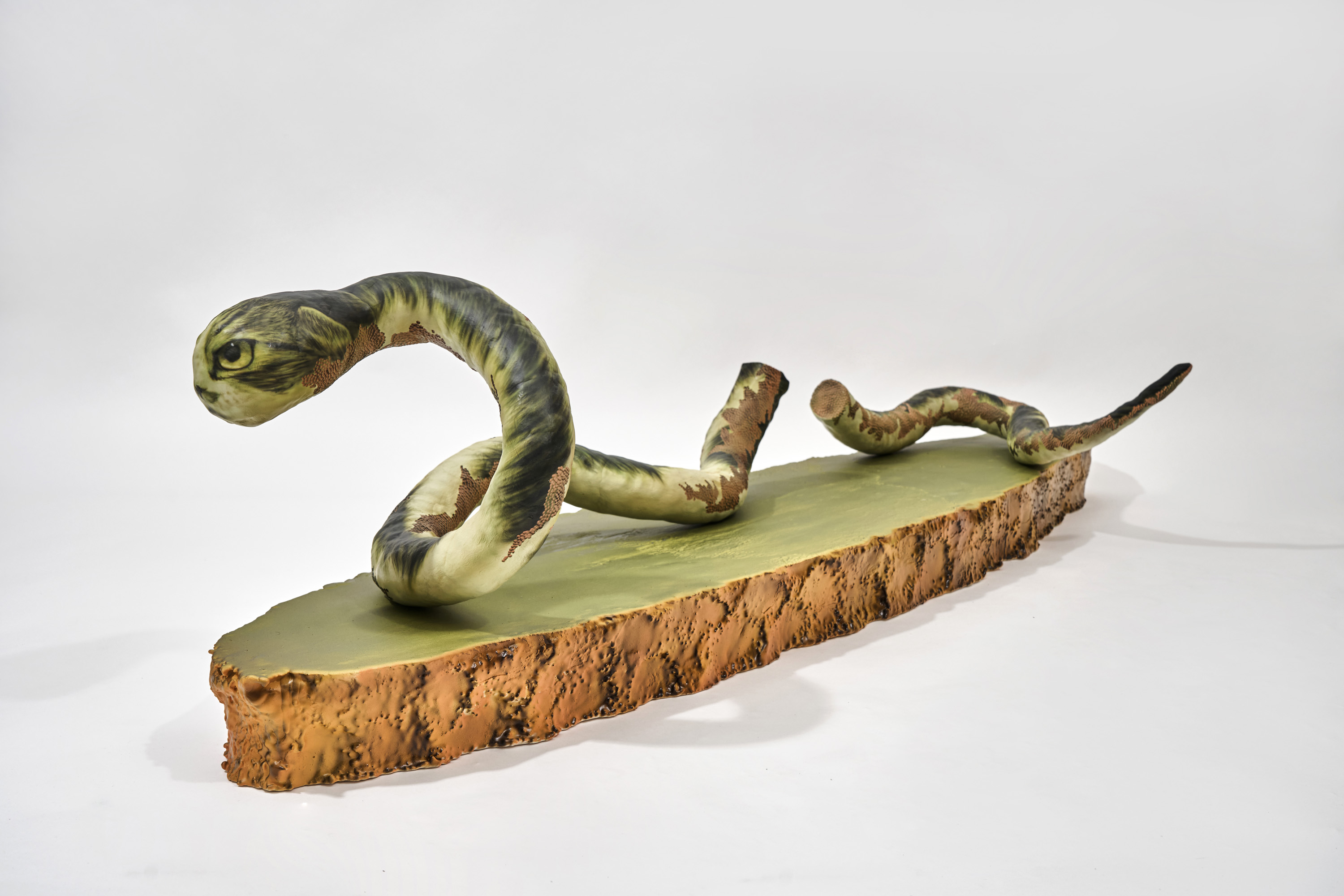 Taewon Ahn,
Hiro is flexible, 2024, Acrylic on epoxy, 150x60x31.5cm ©P21
Taewon Ahn,
Hiro is flexible, 2024, Acrylic on epoxy, 150x60x31.5cm ©P21In this body of work, Hiro’s image is often
blended with distorted forms of cat memes found online, or freely transformed
into figures that resemble insects, other animals, or even architectural
structures. Images from the real world are intermingled with strange, unrelated
visuals sourced from the internet, resulting in compositions that hover between
dissonance and harmony.
In this way, while Ahn’s early works
discovered materiality in images drifting through the virtual space of the
internet and brought them into the context of the real world, his works about
Hiro blur the boundary between reality and virtuality by endowing a real-life
being with the hybridity and mutability of floating online images.
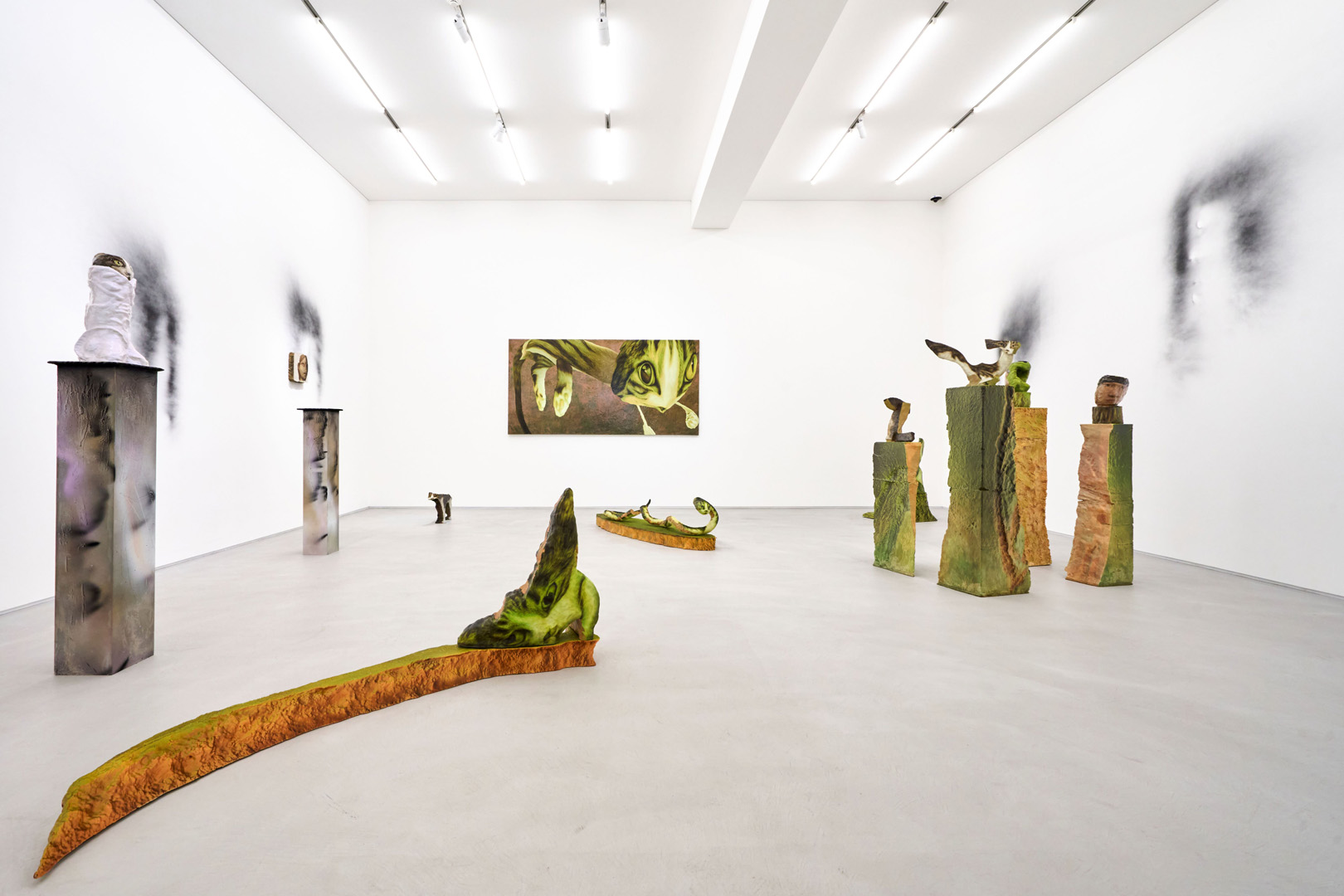 Installation view
of 《PPURI》 (P21, 2024) ©P21
Installation view
of 《PPURI》 (P21, 2024) ©P21Furthermore, in his recent works showcased
in the solo exhibition 《PPURI》
at P21 in 2024, a stronger sculptural gesture is evident. While his previous
three-dimensional works were strongly characterized as "images"
transferred onto the "surface" despite taking the form of sculptural
objects, the works in this exhibition symbolically reveal their identity as
sculptures by being placed on pedestals.
Ahn personally crafted the pedestals for
each of his sculptures and placed "lumps with sculptural masses" on
them. Independent curator Mohee interpreted his pedestals by stating, "The
image-sculptures, placed in an incomplete state, which cannot stand
independently, support the 'situation' of gradually becoming sculptures."
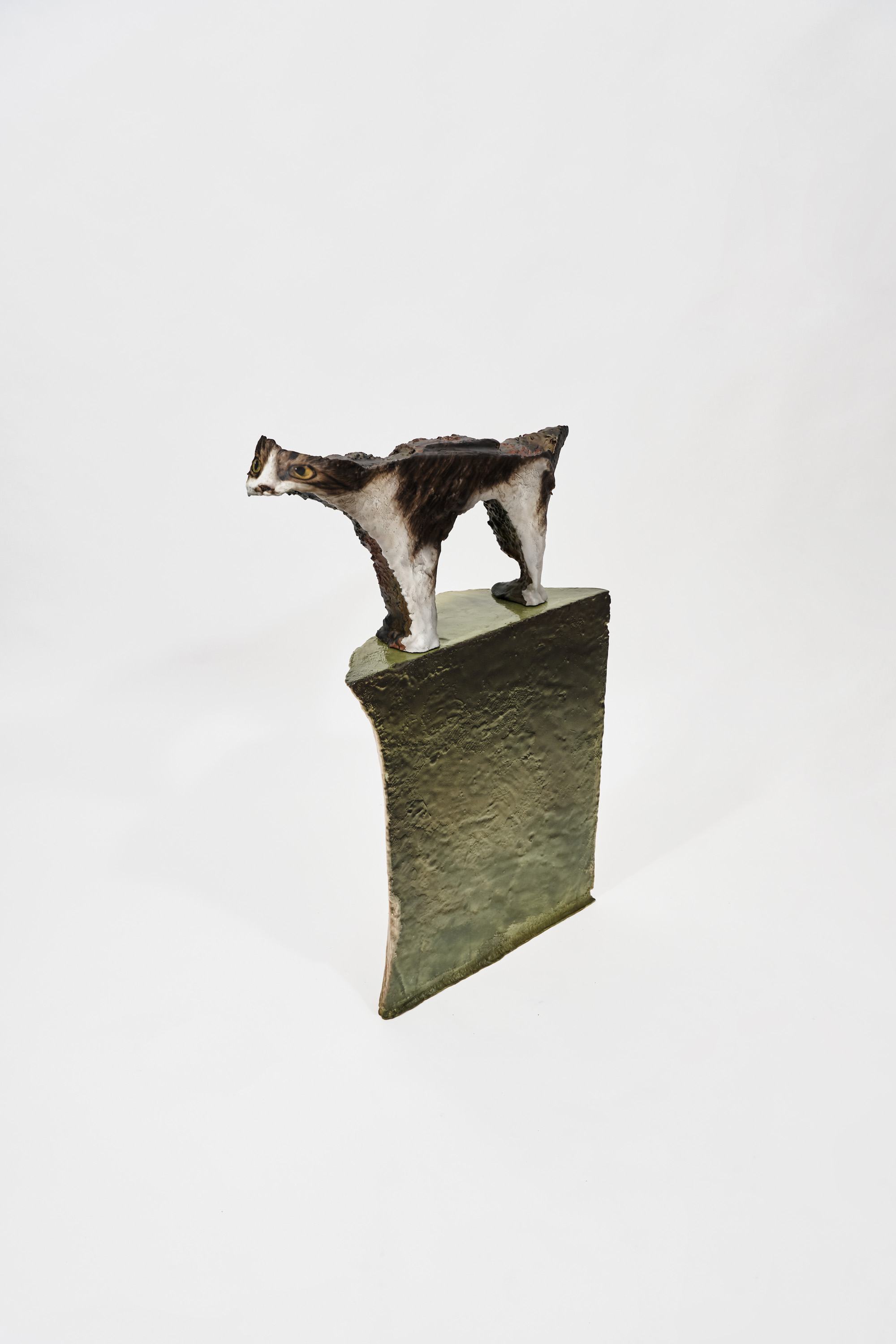 Taewon Ahn,
Hiro is everywhere, 2024, Acrylic on urethane, 66x10.5x34cm ©P21
Taewon Ahn,
Hiro is everywhere, 2024, Acrylic on urethane, 66x10.5x34cm ©P21In addition, the surface of the exhibited sculptures is enhanced with thin, intricate sculptural gestures. By incorporating the labor-intensive method of gradually peeling away the "skin" of the sculptures, Taewon Ahn began to reveal the inner texture of the images. This process imbues the digital images, which would seem untouchable beyond the screen, with tactile materiality.
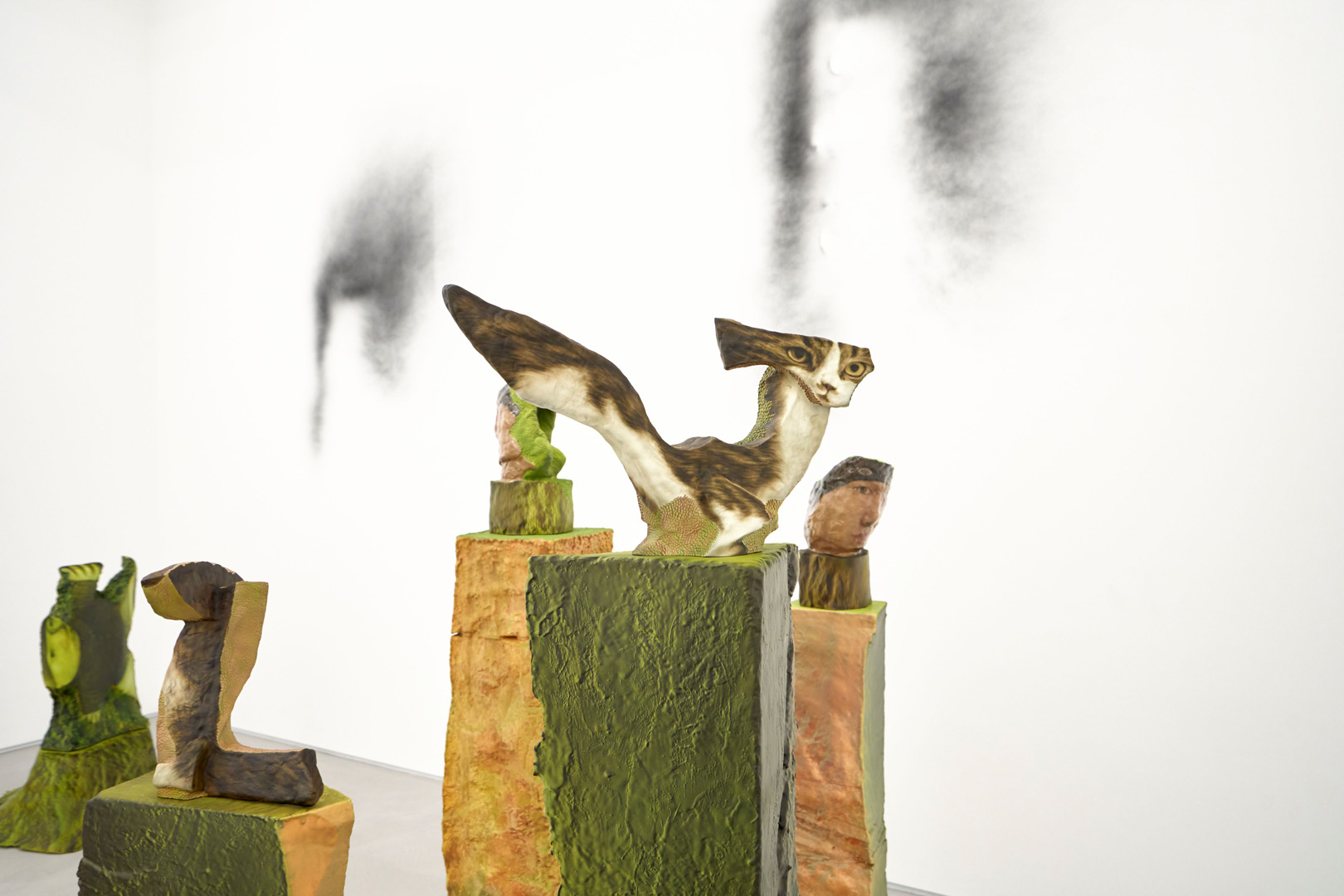 Installation view
of 《PPURI》 (P21, 2024) ©P21
Installation view
of 《PPURI》 (P21, 2024) ©P21Taewon Ahn's work goes beyond simply
reproducing digital images or expressing digital sensibilities; it tactilely
explores hybrid identities formed within the internet environment and the
relationship with companionable connections. In other words, the artist
presents his works as products of a material network where the internet,
humans, and the environment interact, moving beyond the binary distinction
between virtual and real.
Furthermore, his work provides an
opportunity to reflect on how the internet is influencing our lives today and
to contemplate the materiality of the internet to which we are all rooted.
“The distance that can be touched is
approaching infinity, but for some reason, I don’t feel the desire to go. The
things that are physically close actually feel farther away. I want to hold
onto them.” (Taewon Ahn, Artist's Note)
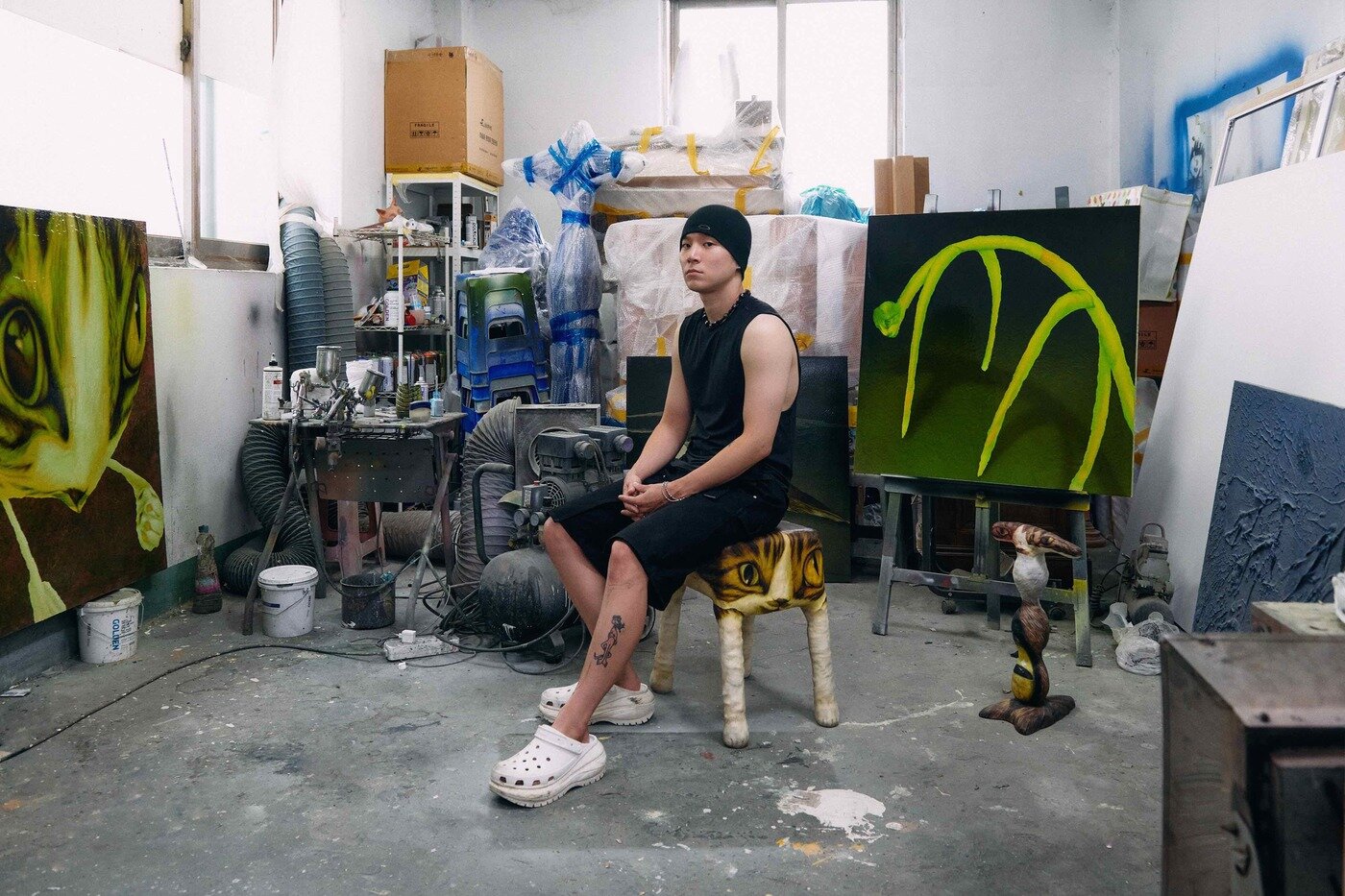 Artist Taewon Ahn
©P21
Artist Taewon Ahn
©P21Taewon Ahn majored in Western Painting at
Chung-Ang University. His solo exhibitions include 《deep
sea fish》 (Diesel Art Gallery, Tokyo, 2025), 《PPURI》 (P21, Seoul, 2024), 《Liminal room》 (Plan x gallery, Milan, 2023),
《Focal point》 (Cylinder, Seoul,
2022), and 《Merge down》
(Gallery Stand, New York, 2022).
Additionally, the artist has participated
in numerous group exhibitions, such as 《Epidermis bares
while shielding》 (Space Willing N Dealing, Seoul,
2024), 《CONDO London 2024》
(Project Native Informant, London, 2024), 《Postmodern
Children》 (Busan Museum of Contemporary Art, Busan,
2022), 《Art Rebuild》 (Boan
1942, Seoul, 2022), and 《Spirit shackle》 (SeMA Storage, Seoul, 2021).
Furthermore, Taewon Ahn has expanded his
presence in the global art scene, showcasing his work at major art fairs like
Art Basel Miami and Frieze Seoul in 2024.




















